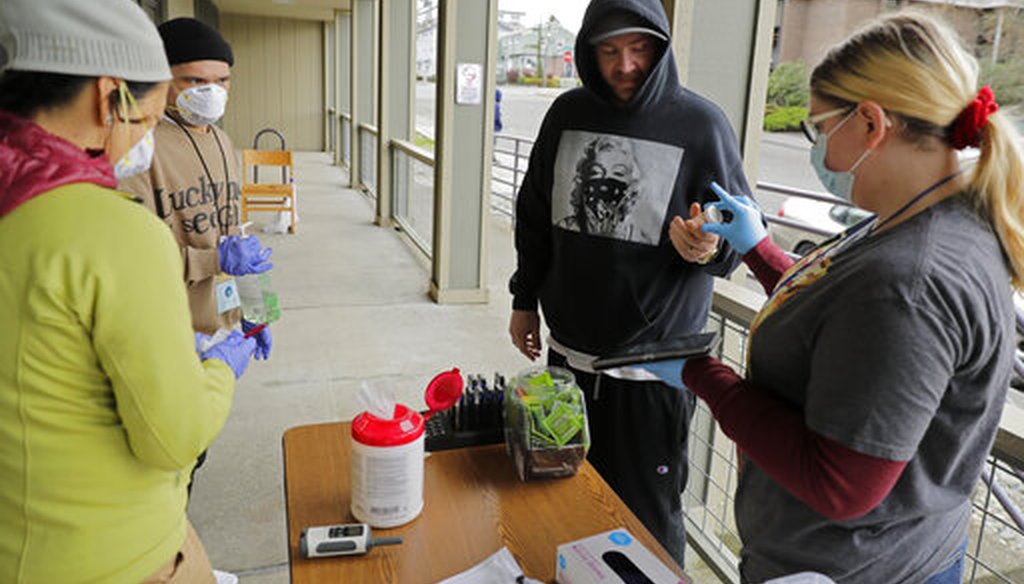

Our only agenda is to publish the truth so you can be an informed participant in democracy.
We need your help.


A patient picks up medication for opioid addiction at a clinic in Olympia, Wash., on March 27, 2020. The clinic is meeting patients outdoors and offering longer prescriptions during the coronavirus pandemic. (AP)
• Manchin misused the term "dependent" to refer to overdoses or crisis cases, but aside from that, he’s accurate about the course of overdoses both in West Virginia and nationally.
• West Virginia data shows increases in emergency room visits due to overdoses in June, July and August of 2020 compared with the same months in 2019.
• In addition, national data shows increases in reported overdoses in a majority of counties, as well as increases after the enactment of stay-at-home orders.
• One academic study found increased alcohol use nationally during the pandemic.
For a decade, West Virginia has struggled with a rising tide of drug addiction. Has it gotten worse during the coronavirus pandemic, when many Americans have had to keep their distance from friends and family? That’s what Sen. Joe Manchin, D-W.Va., said during an interview with the Washington Examiner on Aug. 19.
In the interview, Manchin discussed a bill he’s sponsoring, the Crisis Care Improvement and Suicide Prevention Act. The legislation would direct states to use 5% of their federal Mental Health Block Grant funding to support crisis care services. Neither Manchin’s bill nor a House counterpart has advanced in the current Congress.
"The number of overdose cases, exponentially, is just out of proportion," Manchin told the newspaper. "And they're rising tremendously from the opiate (problem), and now with the COVID-19, and suicide, more people are dependent on drugs or alcohol."
Manchin, whose office did not respond to inquiries for this article, got some of his terminology wrong in his comment to the Examiner. But more broadly, he has a point that West Virginia and the nation have experienced upticks in drug and alcohol use during the pandemic.
Manchin referred to people becoming "dependent" on drugs or alcohol. That means that an individual has a long-term reliance on drugs to function, as opposed to specific instances of using drugs. Complicating matters further, "dependence" is not considered the same as "addiction," though the two conditions can overlap. In 2013, the definitive reference work in the field, the American Psychiatric Association's "Diagnostic and Statistical Manual of Mental Disorders," replaced the terms "substance abuse" and "substance dependence" with the single category "substance use disorder," with three subcategories, mild, moderate and severe.
This is a long way of saying that Manchin misused the term "dependence" to refer to a rise in overdoses or other drug-related crises of the sort his bill would target.
That said, the statistics do back up Manchin’s concerns on heightened use of drugs and alcohol during the pandemic.
Statistics from the West Virginia Department of Health and Human Resources show that emergency room visits related to overdoses rose were higher in June, July and August 2020 than they were during the same months in 2019.
There is also evidence that rates of overdoses have increased across the country more broadly during the pandemic.
We looked at data from the Overdose Detection Mapping Application Program, which collects real-time data from law enforcement agencies, fire departments, emergency medical services, hospitals and medical examiners.
The data shows that after the onset of the pandemic in March, almost 62% of participating counties experienced an increase in reported overdoses. The number of suspected overdose reports rose by almost 17.6% between the weeks before and after state stay-at-home orders were imposed, the data shows.
There’s also evidence of increased alcohol use after the pandemic hit.
A study by researchers from the RAND Corp. and Indiana University’s School of Public Health found that self-reported use of alcohol increased by one day more per month for three out of every four adults during the pandemic. Increases were seen in such subgroups as women, adults between 30 and 59, and non-Hispanic whites.
Manchin said, "Now with the COVID-19 … more people are dependent on drugs or alcohol."
Manchin misused the term "dependent" to refer to overdoses and other individual drug crises like those targeted by his bill. (It’s also no longer the preferred term in the field.)
That said, official West Virginia data shows increases in emergency room visits due to overdoses in June, July and August 2020 compared with the same months in 2019. National data shows increases in reported overdoses in a majority of participating counties, as well as increases after the enactment of stay-at-home orders. And one academic study found increased alcohol use nationally during the pandemic.
We rate the statement Mostly True.
Washington Examiner, "The epidemic raging within the pandemic: Opioid addiction," Aug. 11, 2020
West Virginia Department of Health and Human Resources, data dashboard, accessed Oct. 26, 2020
Overdose Detection Mapping Application Program, data, Oct. 26, 2020
Michael S. Pollard, Joan S. Tucker, and Harold D. Green Jr., "Changes in Adult Alcohol Use and Consequences During the COVID-19 Pandemic in the US," Sept. 29, 2020
National Institute on Drug Abuse, "What is drug addiction?" accessed Oct. 27, 2020
Healthline, "Drug Dependence," accessed Oct. 27, 2020
Congress.gov, Crisis Care Improvement and Suicide Prevention Act
WV News, "Drug overdoses increase during months of COVID-19 pandemic," Sept. 1, 2020
PolitiFact, "West Virginia has the highest overdose rate per capita of any state in our nation," Oct. 3, 2018
PolitiFact, "In West Virginia alone, overdoses have increased by 50% during the #COVID-19 pandemic," July 30, 2020
In a world of wild talk and fake news, help us stand up for the facts.
